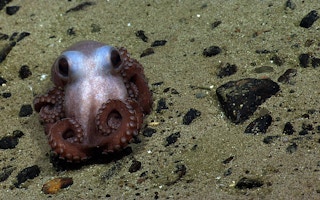In the depths of the Pacific Ocean between Mexico and Hawaii, trillions of potato-shaped rocks are scattered across the seabed - containing minerals such as nickel, cobalt and manganese vital for new green technologies in the global energy transition.
In this ocean region - the Clarion-Clipperton Zone (CCZ) - an abundance of the rocks, known as polymetallic nodules, is increasingly fuelling debate about the mining of metals needed to produce technology such as batteries for electric vehicles.
Environmentalists say deep-sea mining could cause major damage to ecosystems that scientists know little about, yet mining companies argue that it is better for the environment than land-based extraction as part of the world’s shift from fossil fuels to renewable energy.
More than a dozen nations have sponsored small-scale exploration projects, but commercial mining of international waters is not permitted - something which will be debated at a key UN meeting on the issue in Jamaica, beginning this week.
Gerard Barron, CEO of The Metals Company (TMC), which is leading efforts to hoover up the nodules thousands of metres deep underwater, said that mining the ocean does less damage to nature than extraction in places like the Indonesian rainforest.
“Our oceans are full of metals,” Barron said in an interview.
“They come with a whole host of lower environmental impacts than the land-based alternatives.”
“
There is no such thing as low-impact deep-sea mining. It’s the most destructive idea you could possibly think of when it comes to the deep sea.
Jonny Hughes, policy advisor, Blue Marine Foundation
However, many scientists and conservationists - and even some states - disagree, and are calling for a pause or moratorium on plans for deep-sea mining beneath the high seas.
From the European Academies’ Science Advisory Council (EASAC) to more than 100 NGOs, many experts and activists argue that not enough is understood about life in the sunless depths, from exotic fish to sea cucumbers, to open them up to mining.
“There is no such thing as low-impact deep-sea mining,” said Jonny Hughes, a policy advisor at the Blue Marine Foundation, an environmental charity. “It’s the most destructive idea you could possibly think of when it comes to the deep sea.”
The debate is expected to come to a head in Kingston, Jamaica, at the three-week meeting of the International Seabed Authority (ISA), the UN body responsible for regulating the high seas - areas beyond the jurisdiction of national governments where most deep-sea minerals are found.
Governments are racing to obtain a secure supply of critical minerals for low-carbon technologies, but have also made major commitments to protect nature - including a historic deal in March to defend marine biodiversity on the high seas.
For example, the Norwegian government last month announced a proposal to open its national waters to deep-sea mining, whereas in January, France banned the practice in its waters.
However, it was the tiny Pacific island nation of Nauru that sparked controversy and concern in mid-2021 when it notified the ISA of plans to start deep-sea mining - triggering a two-year deadline for the body to adopt an industry rulebook
By doing so, Nauru - which sponsors Nauru Ocean Resources Inc (NORI), a subsidiary of TMC - required the ISA to complete the rulebook within two years, or approve mining plans under whatever regulations exist at the time.
That deadline expired on Sunday, putting pressure on the ISA meeting to decide a way forward. Analysts say countries are still far from agreeing a set of mining rules, and that the ISA is unlikely to give a green light for the industry to begin.
Is mining the sea better than land?
Proponents of deep-sea mining say it is a more sustainable way of obtaining the minerals required for the green transition.
The International Energy Agency has projected that achieving net-zero global greenhouse gas emissions would see mineral demand quadruple for clean energy technologies.
An assessment of TMC’s proposed Nauru subsidiary project in the CCZ by information provider Benchmark Mineral Intelligence said that it could have lower environmental impacts than mining on land in places like rainforests.
But conservationists say comparing land-based and deep-sea mining is like comparing apples with oranges, given that relatively very little is known about the deep sea.










